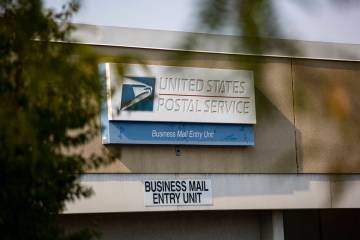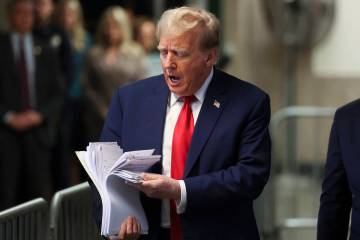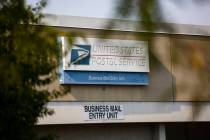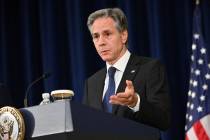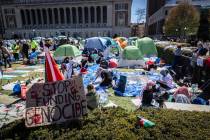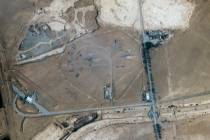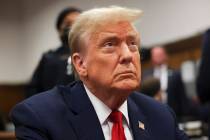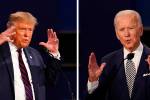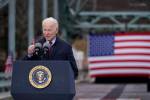Jobs on line for state, schools
Nevada's budget outlook is so bleak that lawmakers doubt whether state government can remain afloat without drastic cuts to everything from prisons to schools to state parks and services for the poor and elderly.
Legislators met Tuesday with Republican Gov. Jim Gibbons to discuss how they will cope with a short-term deficit of about $900 million during an upcoming special session of the Legislature. Some Democratic lawmakers acknowledge options to bridge the gap probably won't include tax increases.
"It is important for all of us to understand how dire it is," Senate Majority Leader Steven Horsford, D-Las Vegas, said. "The things we attempted to protect are now going to be considered for reduction or elimination."
Assemblyman John Oceguera, D-Las Vegas, said pay cuts and layoffs for state employees are probably inevitable.
"These are drastic, drastic cuts. I would be surprised if some folks didn't lose their jobs," Oceguera said.
Lawmakers were not specific about how they would arrive at savings, but prior to the meeting, a budget analyst laid out one grim scenario to the Review-Journal.
Mark Taylor, deputy state controller, estimated that saving $1 billion through pay cuts, if implemented in March, would mean reducing salaries of state workers, teachers and university and community college faculty and support staff by 25 percent to 30 percent through June 30, 2011.
Almost 55 percent of state spending goes to public schools and Nevada's higher education system.
Taylor said such a cut would hit lower-wage employees extremely hard, especially because some lower-paying jobs are held by single parents raising children. There had been talks that salary cuts would be made only to employees earning more than $40,000 a year.
Oceguera was uncertain whether it would be considered "a socialist type thing" to tailor pay cuts according to earnings.
"I don't know if it is possible, but I'm open to look at that," he said.
Assembly speaker Barbara Buckley, D-Las Vegas, said the shortfall would take 22 percent across-the-board cuts to overcome and that she and other legislators agreed with Gibbons they should work together to set priorities and ensure a special session lasts no longer than a couple of days.
"What we are facing is nothing short of sobering," Buckley said.
Dennis Mallory, chief of staff of the American Federation of State, County and Municipal Employees Local 4041, expects "massive layoffs" of state employees and pay cuts during the special session.
"Our folks cannot give up anymore," said Mallory, whose association has 4,000 state employee members. "This is terrible."
A Chamber of Commerce study released earlier this month found state and local government employees in 2008 earned an average pay of $55,657 in 2008, sixth highest among states and $6,800 higher than the national average. For state employees alone, the average pay was $55,266.
Teacher pay in Nevada averaged $48,257 a year in 2008, below the $50,852 national average, according to the chamber study. University and community college faculty members in Nevada earn $69,282 on average, compared with the national average of $72,959.
The study also found that Nevada has the fewest number of public employees on a per capita basis in the country, at 43.7 per 1,000 residents. Sixty state employees have been laid off in the last year and a half. Another 1,096 state jobs were eliminated through attrition, according to the state personnel department.
It isn't any easier in the private sector. Private industries in Nevada last year cut their work forces by 9.5 percent, or 118,000 workers, according to state employment records.
Companies in the state are expected to cut 90,000 jobs over the next two years before slight job growth returns in 2012.
The meeting Tuesday was the third of a series Gibbons has held to get feedback from Democratic and Republican legislators, many of whom have criticized his governing style as paranoid and disengaged.
"It is nice to be working with the governor again," Sen. Bob Coffin, D-Las Vegas, said on his way to the meeting. "He is finally starting to work on this stuff."
During a similar meeting on Jan. 6, Gibbons unveiled a poorly received plan to rewrite the way the state funds education. Tuesday's meeting ended with no concrete proposals. Both sides pledged to work together to hammer out parameters for a special session.
Horsford said the Legislature's Interim Finance Committee will meet Feb. 3, 4, 9 and 10 to discuss the shortfall. There are plans for a public forum Feb. 13.
"Every agency is going to experience some additional cuts, including education," Horsford said.
Some legislators previously held out hope the state could prevent further cuts to essentials such as education. That hope suffered a severe blow Friday with an update from the Economic Forum, five business leaders who by law determine how much the state can spend. The group projected expenses in the state's two-year $6.9 billion budget would outstrip revenue by $580 million, thanks to big declines in nine major revenue sources.
That didn't include a projection of sales tax revenue set aside for schools, which is expected to fall an estimated $250 million short of expectations. An increase in the number of people tapping Medicaid could put the state budget even further upside down.
"The fundamental way in which we provide government services is rapidly coming to an end, as is the time for half-measures," said Jeremy Aguero, a principal at the economics research firm Applied Analysis, who has studied the budget. "The state is in serious trouble."
Fred Lokken, a political science professor at Truckee Meadows Community College in Reno said the budget and special session will define the entire 2010 election cycle for candidates.
"It is pretty high stakes," Lokken said. "Both sides of the aisle have acknowledged we have severe problems. But we never seemed to sit down when we could to resolve it."
Lynn Warne, president of the Nevada State Education Association, said legislators and the governor shouldn't rule out raising new revenue through taxes and fees during the special session in order to prevent cuts to schools.
"I don't have a list of what cuts we would make in education, because I feel we have already been cut to the bone and there is nothing left to cut," Warne said.
But Gibbons, who sets the agenda for the session, has long said he would veto any tax increases.
"Our only real option," Horsford said, "is to eliminate or reduce spending."
Contact reporter Benjamin Spillman at bspillman@ reviewjournal.com or 702-477-3861. Contact Las Vegas Review-Journal Capital Bureau Chief Ed Vogel at evogel@reviewjournal.com or 775-687-3901.





